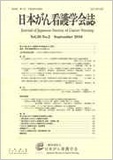Japanese
English
- 販売していません
- Abstract 文献概要
- 参考文献 Reference
- サイト内被引用 Cited by
要旨
目的:再発・転移性乳がん患者がどのように病状や治療を認識し,日常生活の中で服薬を意味づけ,判断し,行動しているのかなど,服薬に関する経験を明らかにする.
方法:再発・転移性乳がん患者を対象とし,半構造化面接による質的記述的研究を行った.
結果:研究参加者4名の服薬に関する経験は,【死の脅威と自分らしい生活とのバランスの揺らぎ(A氏)】【普通の生活の価値と治療の辞め時との葛藤(B氏)】【腑に落ちない服薬の意義を巡る葛藤(C氏)】【生き延びるために自分を鼓舞して続ける服薬(D氏)】が導かれた.死の脅威や病状の不安が高まると,経口抗がん薬を“救世主”“生き延びるため”などと意味づけて,確実に服薬していた.一方,死の脅威が和らぎ,あるいは治療による身体の害の懸念,薬を避けたい感情が高まると,自分の生活に関心が向き,故意に薬をスキップ,飲み忘れることを繰り返していた.
結論:再発・転移性乳がんの服薬に関する経験は,治療への感謝や期待などの肯定的な感情や認識と治療による身体の害や効果の疑念などの否定的な感情や認識との狭間で葛藤し,生活や価値観などを含めて自問を繰り返し,治療を意味づけることによって,故意にスキップする,うっかり飲み忘れる,あるいは確実に服薬などが導かれていた.看護師は患者の奥にある服薬の意味の理解に努め,抑制している感情をも含めた支援の必要性が示唆された.
Objectives:To identify the experiences of medication adherence of patients with recurrent or metastatic breast cancer.
Methods:Qualitative descriptive study.
Participants:Four female outpatients with recurrent or metastatic breast cancer receiving oral chemotherapy at a university hospital in Tokyo.
Data collection:We conducted longitudinal semi-structured interviews (3-4 times) in a private room at an outpatient clinic. Questions included, “How do you manage your current oral chemotherapy?” and, “What is the significance of oral chemotherapy for you?”
Results:The following themes emerged from the reported experiences of the four participants:“An imbalance between the threat of death and daily living” (participant A) ; “Inner conflict between the value of maintaining a normal life and when to withdraw from treatment” (participant B) ; “Inner conflict over significance of uncomfortable medication” (participant C) ; and “Reminding oneself to continue medication for survival” (participant D). Patients gave the oral anticancer drugs meaning as a “savior” or “means for survival” and adhered to medication when the threat of death or anxiety increased. However, when the threat of death was relieved, when they were concerned about physical harm, or when increased feelings of avoiding taking medicine occurred, they repeatedly skipped medication either unintentionally or intentionally.
Conclusions:Patients with recurrent or metastatic breast cancer experienced ambivalent feelings about oral chemotherapy between positive emotions:recognition of gratitude and expectation of treatment; and negative emotions:recognition of physical harm and uncertain treatment effects. In addition, patients created a meaning for the treatment through repeated self-reflection of their life and values. These values regarding oral chemotherapy affected their medication behavior, such as skipping medication unintentionally, intentionally or adhering to medication. In conclusion, other provisions in addition to medication adherence support are required. Support based on understanding the meanings of patient behavior and/or suppressed emotions is vital.
Copyright © 2016, Japanese Society of Cancer Nursing All rights reserved.


